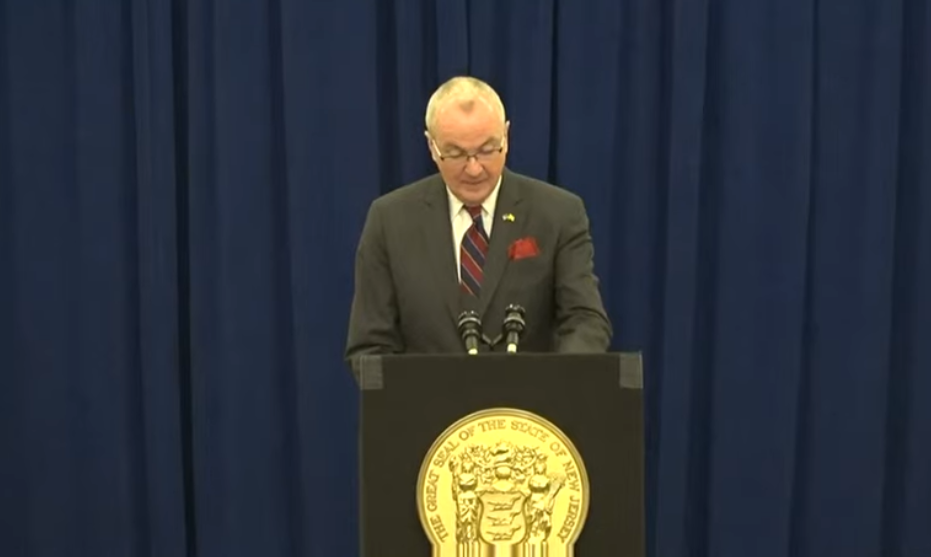Governor Murphy Applauds Attorney General Grewal’s Sweeping Directive Effectively Eliminating Mandatory Minimums for Non-Violent Drug Offenses

Governor Murphy Applauds Attorney General Grewal’s Sweeping Directive Effectively Eliminating Mandatory Minimums for Non-Violent Drug Offenses
TRENTON – Governor Murphy today applauded Attorney General Grewal’s sweeping directive effectively eliminating mandatory minimums for non-violent drug offenses, while conditionally vetoing Senate Bill No. 3456 with recommendations for reconsideration. The Governor’s conditional veto removes a series of provisions that would have weakened penalties associated with public corruption offenses, including official misconduct.
“I’d like to first applaud Attorney General Grewal for his sweeping decision to issue a directive pursuant to his supervisory authority that will allow the sentences of those currently incarcerated for non-violent drug offenses to be revised to what they would have been absent mandatory minimums, meaning hundreds and potentially thousands of non-violent offenders will face shorter prison terms,” said Governor Murphy. “This directive will also take mandatory minimum sentences off the table for future non-violent drug offenses. As a result of the Attorney General’s actions, non-violent drug offenders who are in prison now or who will face the prospect of prison in the future will receive immediate and meaningful relief.”
“During our year-and-a-half-long push to eliminate mandatory minimum sentences for non-violent drug and property crimes, the legislation was amended in a way that would have eliminated mandatory prison sentences for a number of public corruption offenses, including official misconduct,” continued Governor Murphy. “After much deliberation, I have determined that I cannot sign this bill, which goes far beyond the recommendations of the Criminal Sentencing and Disposition Commission. The legislation also falls short because it does not offer relief for currently incarcerated individuals serving mandatory minimum sentences for non-violent drug offenses.”
“I am particularly troubled by the notion that this bill would eliminate mandatory prison time for elected officials who abuse their office for their own benefit, such as those who take bribes,” continued Governor Murphy. “I am also mindful of the fact that I am taking action on this bill in the middle of the trial for George Floyd’s murder, and days after the deaths of Daunte Wright and Adam Toledo. New Jersey’s robust penalties against public corruption offenses, such as official misconduct, are often the most powerful tools that our prosecutors have to hold bad actors in law enforcement accountable. At a time when our nation is finally reckoning with accountability for abusive policing practices, weakening the penalties used to address police misconduct would send exactly the wrong message.”
“The Attorney General’s sweeping directive provides much-needed relief to those currently entangled in our criminal justice system,” concluded Governor Murphy. “I remain hopeful that the Legislature will concur with my proposed revisions to S3456, which reflect the Commission’s original recommendations, and that the Attorney General’s sweeping administrative change will be solidified in law.”
“Our Black and Brown communities have suffered unjust treatment in the criminal justice system for far too long, from experiencing the effects of racially disparate policing to suffering from draconian sentencing laws,” said Lieutenant Governor Oliver. “Governor Murphy’s conditional veto paired with Attorney General Grewal’s directive smartly eliminates mandatory minimums for non-violent drug offenses while preserving the penalties associated with public corruption that can be used to hold rogue public officials and employees accountable. As our nation watches to see if Derek Chauvin will be held accountable, New Jersey cannot weaken the laws that prohibit law enforcement officers from abusing their position of authority.”
“My office has long recognized the disproportionate impact of mandatory minimum sentences for drug offenses on people of color in urban centers,” said Public Defender Joseph Krakora. “And, while we hope that a permanent legislative solution can be achieved, we support the Attorney General’s directive designed to address the issue immediately. Our attorneys stand ready to assist all inmates eligible for relief pursuant to it.”
“I very much appreciate Governor Murphy’s strong support for the recommendations of the Criminal Sentencing and Disposition Commission as presented in the Commission’s Initial Report,” said former Chief Justice Deborah Poritz, Chair of the Criminal Sentencing and Disposition Commission. “Further, in my view, Attorney General Grewal’s decision to issue a Directive that is designed to reduce the effect of mandatory sentences for non-violent drug offenders, both prospectively and retroactively, is a substantial interim step that will provide immediate relief for persons serving or facing these sentences.”
“As someone who has served in the field of law enforcement for over 30 years, I know the incredible trust and authority that is placed in our men and women in uniform,” said former President of the National Organization of Black Law Enforcement Executives Jiles Ship. “I also know that there are officers who abuse that trust and need to be held accountable. I applaud Governor Murphy for rejecting provisions in this legislation that would have weakened penalties for bad actors in law enforcement, and I am thankful to Attorney General Grewal for issuing a directive that will effectively eliminate mandatory minimum sentences for non-violent drug offenses. Together, these two actions faithfully implement the recommendations of the Criminal Sentencing and Disposition Commission, on which I am proud to serve.”
“This decision by the Governor was not an easy one, but it was the right one,” said Reverend Charles Boyer, founder of the organization Salvation and Social Justice. “The Attorney General’s Directive can bring the immediate relief necessary while the Legislature removes the audacious privilege it inserted in this bill. In a time where we have seen political figures, law enforcement, and elected officials abuse their power, we need to keep tools in place to check them. The power given to public officials necessitates higher accountability than average citizens. To whom much is given much is required.”
When Governor Murphy first ran for office, he noted that New Jersey had the largest racial disparity in incarceration rates in the nation, with Black residents being incarcerated at 12 times the rate of white residents. This shocking distinction is the result of decades of failed criminal justice policies, including the War on Drugs, that have devastated communities of color.
In his first month in office, Governor Murphy visited Messiah Baptist Church in East Orange to announce the convening of the Criminal Sentencing and Disposition Commission. By statute, the Commission includes representatives of law enforcement, the Public Defender’s Office, and the judiciary, as well as public members appointed by the Governor and the Legislature. Under the law, the Commission was specifically tasked with examining racial disparities in our criminal sentencing laws. The Governor appointed Deborah Poritz, the former Chief Justice of the New Jersey Supreme Court, and Jiles Ship, the former President of the National Organization of Black Law Enforcement Executives, to serve on the Commission. During the following months, the Senate President, Assembly Speaker, Senate Minority Leader, and Assembly Minority Leader, appointed public members as well.
Under the leadership of Chief Justice Poritz, who was elected as Chair, the Commission spent the next 18 months conducting a comprehensive review of our criminal sentencing laws, holding hearings and listening to stakeholders representing all different perspectives, including advocacy organizations, victims’ rights organizations, criminal justice scholars, and individuals who have personally experienced the criminal justice system.
In November 2019, the Commission released its first report. All of the recommendations were endorsed unanimously, meaning they had support from members appointed by the Governor, members appointed by the Legislature, law enforcement, the Public Defender’s Office, and the judiciary. The report’s most significant recommendation was the elimination of mandatory minimum sentences for non-violent drug and property crimes — both prospectively and for those who are currently serving sentences for these offenses.
Two days after the release of the report, Governor Murphy and Lieutenant Governor Oliver were joined by Senate President Sweeney, Speaker Coughlin, Senator Sandra Cunningham, Senator Nellie Pou, Assemblywoman Verlina Reynolds Jackson, Assemblywoman Annette Quijano, Assemblywoman Linda Carter, former New Jersey Supreme Court Chief Justice Deborah Poritz, former NOBLE President Jiles Ship, Attorney General Grewal, and criminal justice reform advocates at a press conference, where the group pledged to swiftly enact the unanimous recommendations contained in the report.
Over the last year and a half, a number of bills were drafted that implemented the recommendations of the Commission and have moved through the legislative process, including several that were signed into law. However, the most significant recommendation of the report — the elimination of mandatory minimums for non-violent drug and property crimes — was the last to make it to the Governor’s desk.
In August 2020, after the bill had passed the Assembly, an amendment was made to the Senate version that would eliminate the mandatory minimum sentence for the crime of official misconduct. When the amended version made it through the full Senate, different versions of the bill had passed both houses. In February of this year, a new version of the bill was introduced in both houses that eliminates mandatory minimums for crimes determined by the Legislature to be of a non-violent nature. In addition to official misconduct, the bill encompasses a number of offenses not specified in the Commission’s recommendations, including other offenses dealing with misconduct committed by public employees and law enforcement.
The full text of the Governor’s conditional veto of Senate Bill No. 3456 may be found click here to open copy of the senat Bill.








